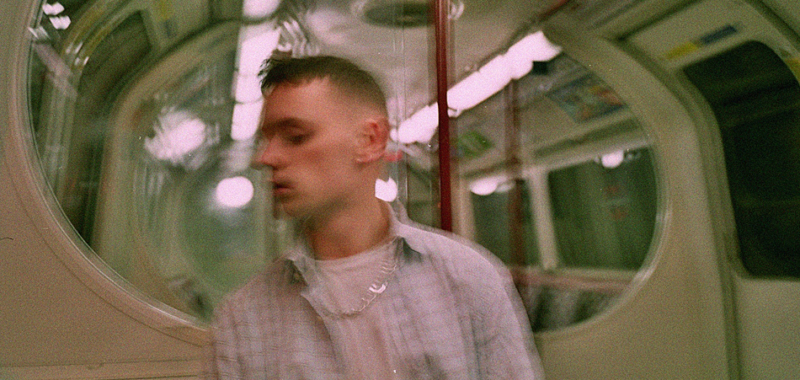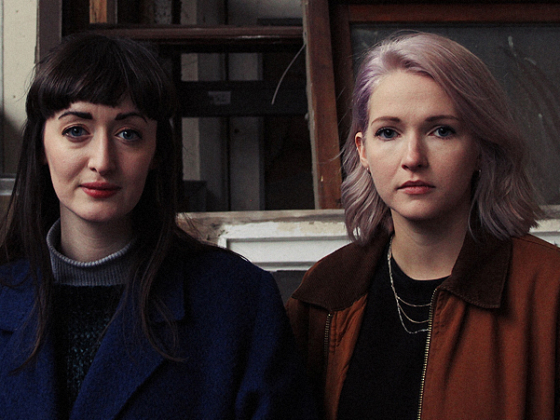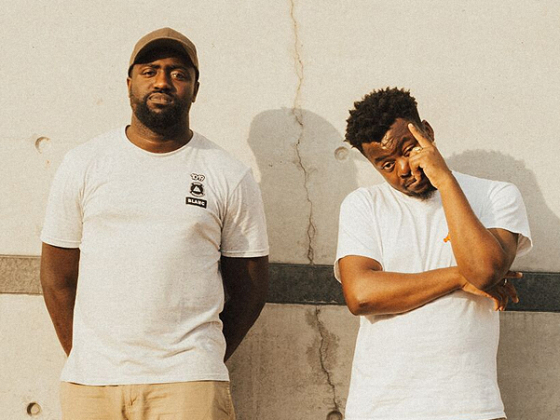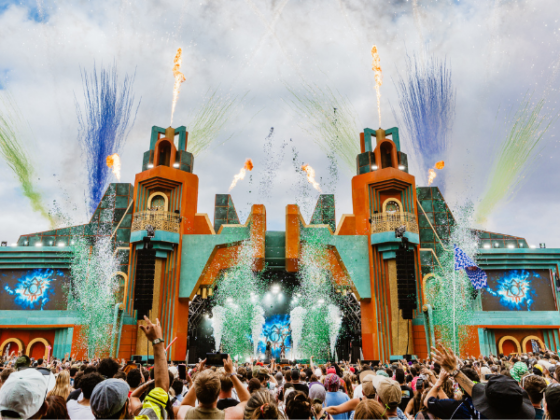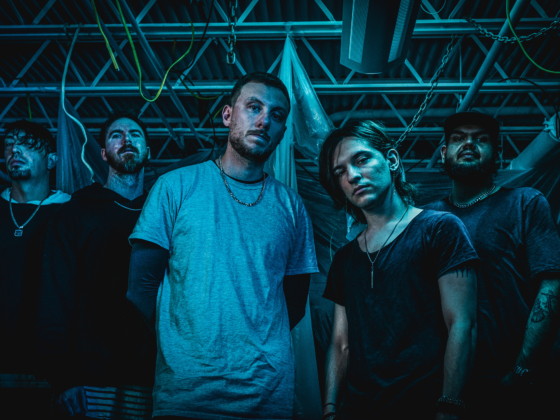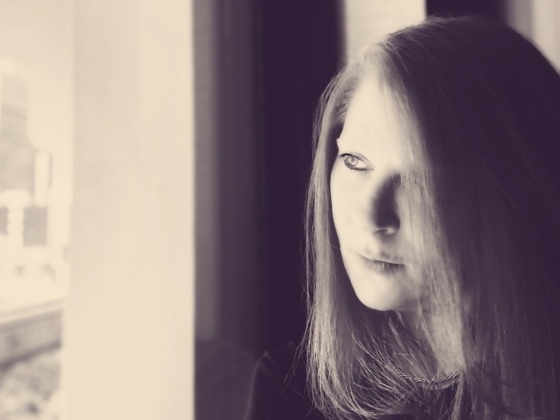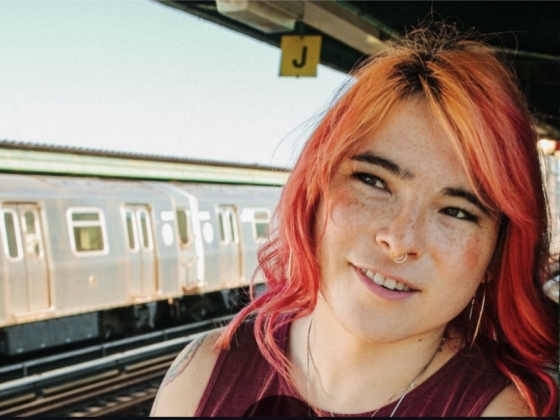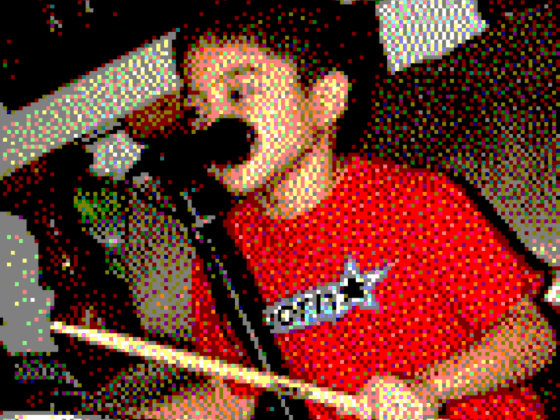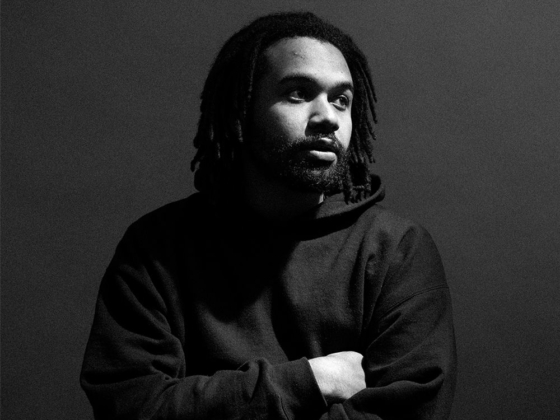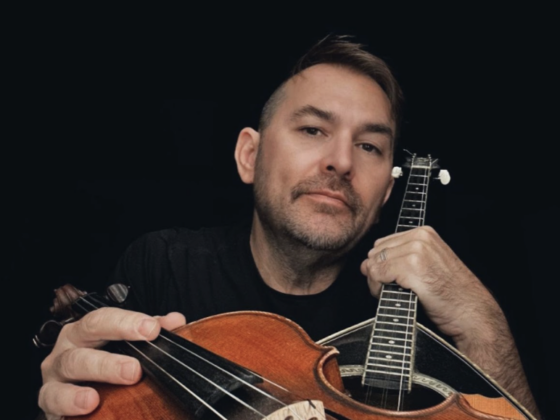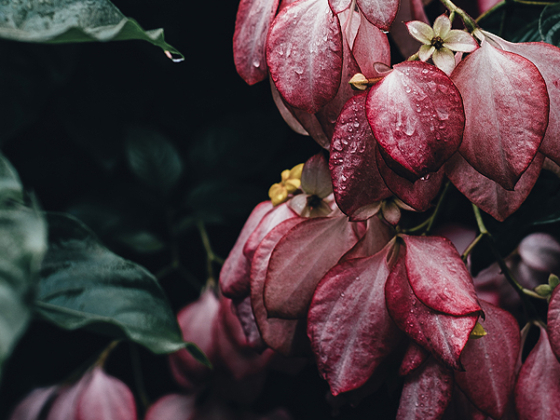Euphonic voice, strong identity, and beautifully poetic lyrics. It's very easy to fall in love with S/E London musician Jacob Allen a.k.a Puma Blue's fluid music. However, the intersectional artist's sound is difficult to define. As a result, Puma Blue occupies an unmistakeable sphere that's just his. With singes of jazz and hip-hop, the intimate sound of bold and vibrant autumnal colours interlace perfectly with raw, experimental guitar, and sweet vocal textures that effuse into the corners of his songs. Puma Blue captures fleeting personal moments of vulnerability, like a postcard or a letter you keep to come back to. In essence, his music is completely felt.
EARMILK caught up with the musician, in nonetheless one of our most instant and natural conversations yet. We talked at length, and without delay jumping through chat. Exciting topics included production and engineering, poetry, intuitive instruments, experimental playing, and not to mention music that was made, to never be heard. With this in mind, please dive into one of our deepest, and highly tantalising interviews to date. Similarly following previous artist to watch interviews with Nilüfer Yanya and Billie Eilish. We're predicting some big things for the candid Puma Blue; especially, given how in touch he is with his art.
EM: How did you end up working with Ben Baptie [Moses Sumney, Daughter, Empress Of] on your new song “Only Trying 2 Tell U”?
PB: He’s a really cool guy. I was producing that track myself, I had some help from my mate Lloyd who used to play guitar from me as well. We set-up on his room with his gear and produced the bones of it together, also the keys and the bass part with my friends Harvey and Rudi who are in the band. I took it home and did loads of production on it by myself in my room. It was cool but I really felt like for this track to be worth doing compared to the demo version that it really needed someone to come in and mix it beautifully. It’s a really delicate craft. As soon as we got in touch he was so enthusiastic. I ended up going to his studio and redoing the vocals with him, which was so quick. He just made me feel really comfortable. I took it home and made quite noisy and added weird stuff. I’d definitely work with him again.
EM: Producing and engineering are entangled in way, but they’re also two very different skills. What do you think?
PB: The way I see it is the engineering is the science and the production is kind of like the fun creative side. Some records I feel like the engineering is the production. It gives more of the idea of the sound, mood, and aesthetic than even the production does. The guy that engineered Nirvanas album – Steve Albini; he just mics up a band in a really honest way, to just get the exact sound of how they sound in that room/ garage / environment. He refuses to be called a producer because he sees himself as an engineer.
EM: It sounds like you have so many influences and outlets for different genres. I gather you have other monikers as well?
PB: I guess I don’t see it so much as different genres, but different branches of the same musician. The songwriting I’ve been focussing on the most since I was 13 has really changed and developed. That’s essentially what’s become Puma Blue but alongside songwriting, I’ve always made music that wasn’t meant to be performed, or even heard. I just decided to start putting some of it out. I guess it just didn’t really sit under the same moniker as Puma Blue. Also, I just love exploring different characters.
EM: That’s really interesting about making music that’s not really meant to be heard. I think every musician makes music that just doesn’t fit under their main direction. And, people would totally enjoy it if they heard it. There’s probably heaps of unheard, unreleased music that’s just lost in the vaults. It’s kind of exciting because it means that things could just bubble up whenever, but, in some ways, it’s also such a shame, because it’s often doubt that holds people back.
PB: Yeah I guarantee that. I reckon there are some absolute masterpieces that we’ll never, ever hear. It’s kind of amazing isn’t it? There’s probably so much music that’s just sat on. It’s sad too. For a long time I didn’t really care, and wasn’t very shy. I knew that my music wasn’t good enough, but I just really wanted to put it out anyway. Some other people are just not that same way. Maybe it’s a good thing that they’re being really tasteful.
EM: Yeah it could be. From the sounds of it you play a lot of instruments?
PB: I don’t play that many. I know some cats that play, like 10 or something. I just play drums (that was my first instrument), and then I picked up guitar, got into producing, (which I kind of see as an instrument), singing as well, and I play bass. And, like the tiniest bit of keys. I’ve been teaching myself a bit of trumpet as well, but again I’m terrible.
EM: I love that you say you don’t play that many, just before reeling off a long list of instruments you play! I’m wondering that when you’re songwriting as Puma Blue (which in some ways is very guitar and voice focussed) do you think about the other parts too?
PB: It depends on the song. I think I always think about drums because being a drummer from day it kind of like permeates everything else. I can’t ever really get that mentality out of my head. When I’m songwriting I’ll approach things on keys or guitar, as I’m mostly interested in the harmony side of things. Some tunes I’ll just build it around a simple part, and think loads about the texture and the orchestration of it. Other tunes it’s almost as though the whole song is on the guitar and then I have to really think hard about what I could use the other instruments for. Sometimes they just aren’t supposed to fit. But, yeah it really depends on the song.
EM: So it’s more on what each song feels it might need?
PB: Yeah, exactly I think less is more. If you can do without something I always think that you can do without it to be honest. I think it’s crazy that I even have four other people in the live group. I used to just gig with two people and myself, and kept it really minimal, but I think having those options there’s always something interesting that could be happening. Even if it’s just tapping your guitar with a delay effect or something it adds so much atmosphere. I do think about the texture just as much as the song itself.
EM: Do you feel like as a drummer you approach other instruments in a more percussive way?
PB: Definitely yeah. I mean I’m obsessed with harmony and chords, and that side of it, but I’m always thinking in rhythms and how they can cross over each other or fit aside each other. A couple of my friends have told me I play the guitar like a drummer.
EM: Who are some people that influence your writing as Puma Blue?
PB: I love Julie London. It’s always hard to talk about your influences when you listen to so much. It’s hard to know what has gotten through to your music, and what has gotten through to you as a person. I think the simple answer is everything gets through to your music whether you like it or not. I think some of the stand out influences from things are probably more obvious.
PB: Jeff Buckley has been a huge influence on my everything really. My songwriting, my playing and my voice. Even my approach to the guitar. I remember he said this crazy thing about when he was a kid he had this guitar that didn’t work, and had missing strings. He had no interest in it either, so he just used to roll his marbles up and down it because he was fascinated by the sound of that. He went through his teenage years and was way more interested in being a crazy technical metal guitarist. But, when he was writing the stuff that we know him for, he said he came back to playing guitar in the same way when he was a kid. That really inspired me, and I always try and approach the guitar from a way that feels kind of different.
EM: Yeah I was really interested to talk to you about Nirvana as an influence, you mentioned Steve Albini earlier as well. When I saw your live show there were a few songs that just had a really different, & intense, raw energy to your recorded work.
PB: Yeah, jazz can be really gnarly. I grew up listening to funk & rock, and that lead me into punk – Slints, Deftones, James Charles and the Contortions. I guess I always wondered what it would sound like to cross a really sultry & smooth jazz sound with a sort of grungy punk energy that’s really dissonant, urgent and aggressive.
EM: For me, a good musician is someone is really fluid; versatile, and flexible, and knowledgeable in lots of different areas and genres etc. Like you were saying earlier bedroom producing is almost it’s own instrument now. What do you think?
PB: Yeah people like Elliot Smith and J Dilla are so different stylistically, but if there’s anything I’ve learned from them both it’s that you can create anything in a room with minimal equipment. Whether it’s layering up loads of sounds, like Sgt Pepper (I think they recorded that album just with a 4 track- tape machine, and there’s all that texture on there). Or you can just have just single guitar and voice and a simple beat and sample. It doesn’t really matter. It’s about using your imagination to sculpt things you’re seeing and feeling in your head. I find that really interesting painting in all these different colours. It’s so much more exciting than trying to whack out processed cans of whatever people think “Puma Blue” is. And, making that over and over again. Even if you could do that I think it would be really hard. I think it’s easier to write from scratch every time.
EM: I guess the thing about art is that it's impossible to recreate the same thing over and over. How do you approach your sound?
PB: I don’t really know what my sound is; it would be hard for me to write for a brief. I just have to go with whatever feels right in that moment. Everyone that I’ve just mentioned as influences are very multi-faceted – Tom Waits, Jeff Buckley and John Frusciante just kind of change with the time and even in the same era across it. I always thought why shouldn’t music be like that. People are so complex and have so much to say other than just one thing. Why would you just say one thing in your music y’know?
EM: I’d like to know more about your art-direction for album art and photos etc. Do you have any big influences? I was getting a sort of James Dean vibe. A lot of his photos are in B&W, and quite enigmatic, but also very upfront and honest in style.
PB: Oh again, interesting compliment! I’m a big James Dean fan used to want to look like him when he was a kid. He’s really cool, I’d never thought about it like that, but that’s wicked. When I started out putting visuals to music it was very much the idea that I kind of just wanted my music to feel like a black and white film. I’d been watching a lot of film-noir at the time. However, I wanted to get away from that over the last two years. It felt a bit cliché all of a sudden. I wanted to do something different.
PB: I stumbled upon some films that the black & white films were giving me, but were super rich in colour. There’s a film called Paris Texas if you’ve seen that, loads of Wong Kar-Wai films, In The Mood For Love, Fallen Angels, Chungking Express, Lost in Translation by Sofia Coppola. I realised that I could create the same feeling by using these really dim rich colours; lots of orange, blue and red. I got really into David Lynch as well for a bit. For a while, I hadn’t even seen his films I’d just been looking up stills from his movies and stuff. I find my music visual when I’m making it and listening to it back, and I just have an eye for things when I’m out and about. I really wanted to make something that feels like the music or something that compliments it. It’s become this dusky evening thing.
EM: You make some visuals yourself. Can you tell me a bit about the video you made with your brother?
PB: I'm inspired by surroundings and where I live. Autumnal colours, trying to capture the feeling of isolation and mundanity. I really threw together stuff that felt like me at the time, in terms of the colours, and content. So my brother got involved as I wanted to be in the video as well. Most of the video was so casual and close to home, it almost felt a little too personal at this stage, so I decided to wear a suit to keep it a little bit detached, so it felt like more of a performance than a video diary or something. It was cool doing it myself and editing it because I had complete control over what it came out like.
EM: You mentioned that you made a visual diary for your tour, and also for your poetry. When you write poetry do you write it as you would perform it as a song?
PB: I don’t think so. What I have noticed in my stuff recently is they definitely have rhythm. When I started writing poetry a few years ago I never really read them aloud. When I previously performed my early poems I’d really struggle with reading them out to people because they really weren’t written with public speaking in mind. But now I’m performing poems so much less, but I really think about the inner rhythsm and the rhymes. I don’t really think about how they would be performed, but more how they come across when you read them in your head. I want them to come across really naturally and think more about how they flow as a thread and follow and trying to use words in a really interesting way.
EM: Do you have any instrumentalists that influence your writing and singing?
PB: There’s a saxophonist called Don Byas who’s really influenced my phrasing when I sing. He’s got this gloopy, caramel sound. Everything he plays sounds like it’s rolling over a surface and really beautiful. He’s also got grit in his sax playing that I really like. He’s been a huge influence. Also, Frank Sinatra’s spacing and timing, it’s like he’s a violin or something. John Frusciante too – his guitar playing in general. He’s so raw. He’ll leave all the mistakes in the recordings. He’s got this amazing funky, earthy feel. It’s never too slick, it’s always got so much character. I always try to retain that in my playing, just like a rawness and a kind of ignorance. Jimi Hendrix as well for the same reasons; another guy who treats the guitar like a piece of wood rather than an instrument.
EM: You talk a lot about playing the guitar in a very experimental way. If you were going to redesign it what would you change?
PB: I don’t know that’s a really tough question. If it could just move around more in terms of the actual sound itself; so like instead of using pedals you could just create those chasms of sound just with your fingers in ending the strings. And, distorting it without a distortion pedal maybe on certain notes that would be really cool. You could kind of play it with your whole body that would be amazing.
EM: Almost more intuitive and more in-tune with you? It would also be amazing to have your own sound space but just of that instrument, so you could just step into it and immerse yourself, but then step out and hear everything. This needs to happen.
PB: Yeah, we need to find a scientist or something!
Puma Blue live dates:
19 FEB – THE CASTLE, MANCHESTER [SOLD OUT]
20 FEB – HEADROW HOUSE, LEEDS
21 FEB – OMEARA, LONDON [SOLD OUT]
22 FEB – HOPE & RUIN, BRIGHTON
23 FEB – CROFTER'S RIGHTS, BRISTOL
24 FEB – SUNFLOWER LOUNGE, BIRMINGHAM
16 APR – LE POP UP, PARIS
17 APR – ACEPHALE, KÖLN
18 APR – SUGARFACTORY, AMSTERDAM
19 APR – MOJO JAZZCAFE, HAMBURG
20 APR – AUSTER CLUB, BERLIN
23 OCT – SCALA, LONDON
Connect with Puma Blue: Facebook | Twitter | Spotify | Instagram | SoundCloud

